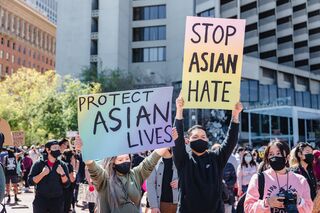Bias
The Model Minority: The Psychology of Asian American Racism
Exploring racism against Asian Americans.
Posted June 25, 2021 Reviewed by Davia Sills
Key points
- Calling Asian Americans and Pacific Islanders "the model minority" is a limiting label that can render them invisible as a marginalized group.
- Experiencing racism is a form of trauma that can lead to symptoms of PTSD.
- Ways to manage or prevent symptoms of racism include seeing a trauma-informed therapist, joining a support group, reporting hate crimes, etc.

"The model minority." How I have come to despise that label! It has restrained me rather than giving me hope for reaching my fullest potential in life.
For the most part, in receiving some of the privileges that haven’t been afforded to other marginalized groups, I have also noted that we are rarely ever included, specifically when other BIPOCs are mentioned as having faced racism. Our struggle and conflicts in this matter have been ignored as if we should be grateful that we were allowed to assimilate while other racial groups were not afforded that privilege. This privilege comes at a heavy price.
The psychological impact of the “Model Minority”
We are invisible!
For future generations, we are neither Asian nor American. I don’t belong in China. I don’t belong in the United States. The larger question becomes: “Then who am I, and where do I belong?”
As I grew older, these questions plagued me, and I had no role models to follow. It was always my parents and me. Everything I learned about being Chinese came from them.
We didn’t even live in Chinatown. We lived in Germantown in NYC, because having lived in Paris for 9 years and staying with German friends every summer, my father felt comfortable in a European setting. Me, I felt lost, the only Chinese child in the entire school! No one at home to help me be American. No one outside to help me be Chinese. I felt split in two.
I must admit that, in general, it is very much part of Chinese culture to be compliant, to not make waves, to work hard, to study hard to get a good job, to not report when violently assaulted, to respect our elders. If we do as they say, then we will reap some of the benefits that the dominant group in society has. But the psychological toll, sadly, is the sense of “mo ban fat!”—a phrase repeated by my parents when they felt powerless to stand up to racial targeting because they knew no one would help. It means “there’s no way." It is a forced acceptance of what life meant to them, that they had to comply or pay the price.
One thing my father drummed into me over and over again was that I was to tell people that I hated the Chinese, that I’m not Chinese, and that I’m an American. He said we’d be exiled back to China if I didn’t. And with McCarthyism in full force at that time, I can now understand his dread, especially since our escape was because Mao Tse Tung, the Communist leader, had him on his execution list and almost caught us as we were escaping. Not understanding my father’s heightened fear that he would be deported back to China for execution, at 3 years old, I was already ashamed of how I looked. I hated being Chinese for the longest time.
My parents were exponentially traumatized by immediately facing racism, something for which they were totally unprepared. All the stories they had heard were about how America stood for equal opportunity and freedom for all—then to find out it was all a lie. This does away with our sense of pride in who we are, our sense of self-confidence, our sense of well-being, that we come from a rich ancient culture that existed thousands of years and made many scientific and medical discoveries before the United States was even a thought in anyone’s mind.
Sadly, it is still a label that clearly highlights that we still do not belong, that the xenophobia inherent here is stronger than the idealism that all have equal opportunity. We are still the “other” when white Americans feel they are being outdone by us, that we are taking away jobs from them, or when they are told by our past president, in so many words, that it’s our fault that COVID-19 was brought in by the Chinese. And cruelly so, since those of us whose families have lived here for generations and have not even set foot in China are being accused of literally bringing the virus over to these shores.
What I’ve garnered from the above, as well as daily racial targeting throughout my childhood, is that we will never belong. This is what all the anti-Asian hate crimes that have escalated with the pandemic point to. It doesn’t matter that we can speak correct English, that our second, third, and fourth generations have been able to advance through higher education, hold white-collar jobs, and live in nicer neighborhoods. It somehow comes back full circle that we are still “less than,” that we are a displaced people, especially when one has been raised in the United States. I don’t belong here, and I don’t belong in China.
The psychological impact of racism
APA points out that “people victimized by violent hate crimes are more likely to experience more psychological distress than victims of other violent crimes. Specifically, they’re more likely to show symptoms of post-traumatic stress; fearful concerns about their safety; states of anxiety, anger, and depression; and lowered self-esteem."[1]
I can personally attest to the above statement. A lifetime of facing overt and covert racism tears down one’s sense of self, well-being, calm, joy. I had suppressed anger all my life until I went into therapy when I was 35 years of age because I was headed for a nervous breakdown. It was there that I learned I had held in all the anger and rage at what was done to me, instead living with constant fear every time I stepped out of my home. The impact of racism never leaves.
When the past president announced that China brought the virus, I knew that racism would rear its ugly head again. And the first time I was ready to leave the house, I was triggered into complex post-traumatic stress disorder (complex PTSD). I was age 5 again, my whole body shaking with panic that I would once again be attacked as soon as I stepped out the door. I am thankful that therapy helped me to be aware that I was not my age but 5 years old again, reliving those times I was pushed, shoved, spit at, called names, etc., walking to school and in the school playground. The teachers did nothing except to tell me I was over-sensitive.
That’s what happens with either form of PTSD: The survivor believes that it’s happening all over again in the present. The prefrontal lobe of the brain and the body chemistry re-enacted what happened when I was 5. Therapy saved my life. Understanding this, I learned I could manage the disorder. I took deep breaths until I felt calmer, at the same time reminding myself that I was triggered, that this was not happening in the present moment.
Somehow, we are not socialized to realize that racism is traumatic, the definition being that one is rendered powerless. The unconscious brain finds a way to protect the victim by having him/her go into fight, flight, freeze, and fawn mode. I would go into freeze, not feeling my body, my mind shutting down. As a lone 5-year-old with groups of children pounding at me, I had no way to defend myself. Whatever coping mechanisms I had would not work.
Being scared all my life has definitely adversely impacted my self-esteem and ability to take care of myself. When one becomes depressed, in order to numb from the ravages of hate, one doesn’t feel anything. To feel would be devastating. When one is always scared, one can also become hypervigilant, looking for violence at every turn. Either way, the central nervous system has no reprieve to calm down. The survivor becomes so focused on surviving that happiness and joy don’t even enter into the picture.
Ways to overcome racism
Unfortunately, in my opinion, with our nation being so divided and violence erupting as we speak, I don’t realistically see that this institution is going away anytime soon. However, there are ways to manage racism so that one does not become as traumatized.
- See a mental health practitioner, a skilled trauma-informed one, preferably one of your own race or who has experienced the impact of racism.
- Form or join a support group so that you don’t have to fight this alone.
- Form or join a committee in your community where the members look out for each other.
- Report hate crimes [2]—reporting makes people feel safer.
- Raise money to protect your community [3]—for example, an elderly Chinese woman who raised money on GoFundMe is giving it to the community.
- Start getting involved in your local government—have a voice!
- Find self-care techniques, i.e., meditation, qigong, yoga, journaling, walking in nature, watch a funny film, etc.




